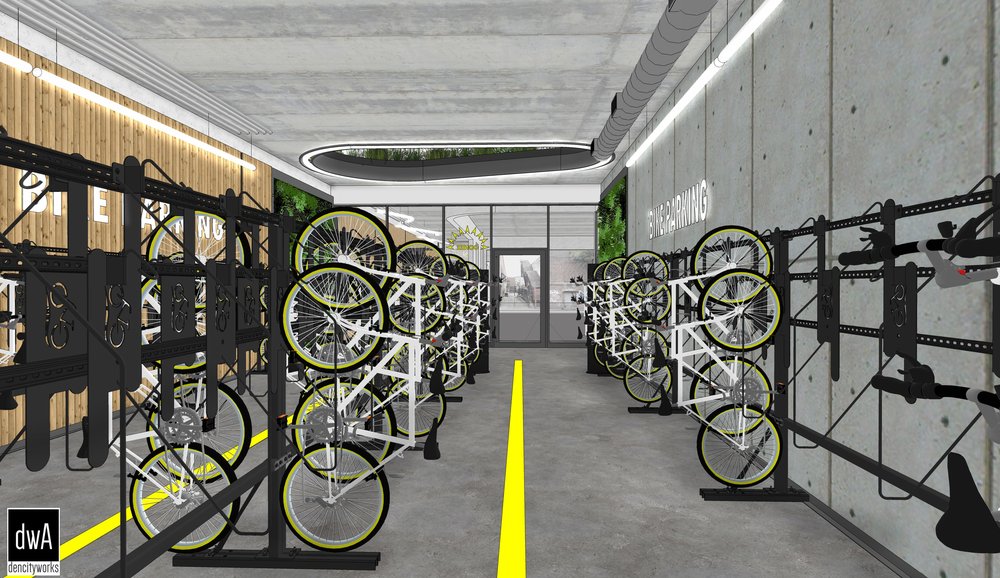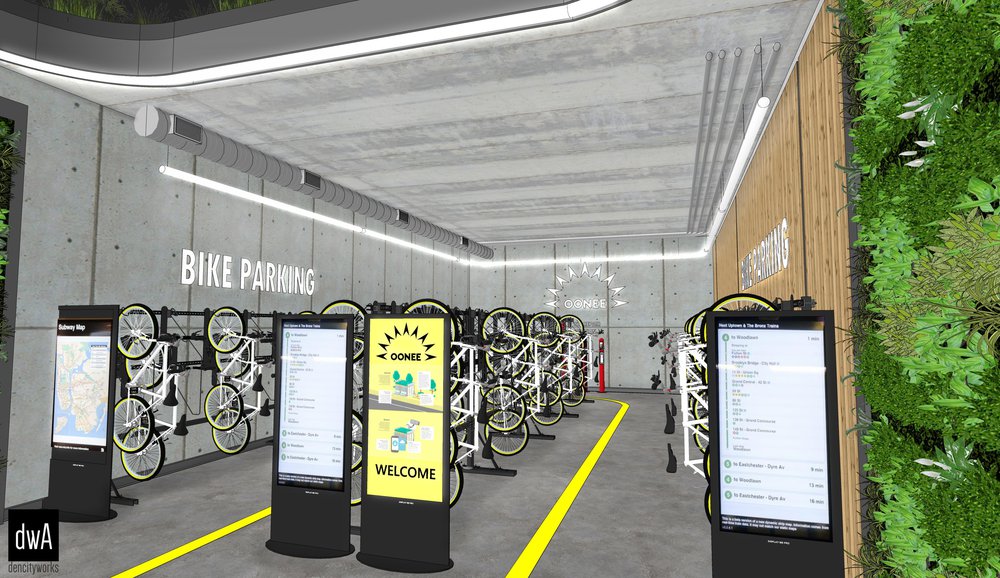New Sunset Park Housing Development To Include Modern Bike Parking For Delivery Workers
April 28, 2021, 5 a.m.
A housing development planned for Sunset Park features secure bike parking for residents and free slots for delivery workers.

New housing developments are often required to provide parking for cars onsite in order to gain city approval, but a new 14-story building planned for Sunset Park, Brooklyn includes a unique provision: a secure bike parking garage that reserves space for delivery workers in the neighborhood.
If successful, organizers of the project hope bike parking for the public will be part of future large developments in the city, which has a shortage of bike parking spots. The current tally of 56,000 spots citywide isn’t nearly enough to meet the growing population of cyclists, although the city has a goal to install 10,000 new bike racks this year.
At the same time, delivery workers face an ongoing threat of bike thefts. Recently, one worker was killed when he refused to give up his e-bike.
According to renderings, the bike parking location wouldn’t be a dingy corner in a basement, but a bright, above-ground space with digital displays that have subway information about the R train, which will be accessible from the new development as well. It would have room for at least 100 bikes. About 33 percent of the space would be reserved for working cyclists in the neighborhood to use for free.

The new development recently approved by the city, known as 737 4th Avenue, includes 100 units, 40 of which would be designated for residents of the neighborhood earning between $20,000 to $60,000. There’s also designated space on the ground floor for commercial tenants.
The bike parking system on the site will be provided by the company Oonee, which has set up secure bike parking pods in Journal Square and Atlantic Terminal. Another location had been planned for South Street Seaport before the city cancelled the program.
Many delivery workers live in Sunset Park, and leaving an e-bike either outside or overnight can be risky. E-bikes often cost more than $2,000, are paid for by the workers, and take away their ability to work if they’re stolen.
“For some, this is a matter of life or death. For some this is a matter of ‘Can I feed my family? Can I send money back home?’” said Shabazz Stuart, founder and CEO of Oonee. “This is going to be a facility that allows people to safeguard their livelihoods.”
Still a far cry from the Dutch indoor bike parking garages, which have space for thousands of bikes, the developers of the Sunset Park building, Totem, hope this model will be a requirement for future large developments, especially in neighborhoods where e-bike delivery workers live.
Listen to reporter Stephen Nessen's radio story for WNYC:
Glendy Tsitouras, an organizer with Los Deliveristas Unidos, said it’s an intriguing idea, but that delivery workers need secure places to leave their bikes all over the five boroughs.
“It could be good if this is in the entire city, every apartment, every building should have a secure place where workers can park bikes without being worried that they’re going to lose the bike,” she said.
Tsitouras added that one low-tech thing everyone can do to ensure workers aren’t victims of bike theft is to meet them downstairs, rather than having them bring food directly to people’s doors.
City Council Member Carlos Menchaca represents the district where 737 4th Avenue is located and approved the project. In a letter of support he called it “not perfect,” but said the planning was “the most democratic and participatory forum we have in the neighborhood.”
“It will not, for instance, build 100% affordable units, which I believe we need to build in our City. But it does represent the clearest example yet of the only thing that will break and reverse the cycle of displacement and gentrification plaguing our City: community-driven and accountable development,” Menchaca wrote.
He said that after a year of deliverers enduring the pandemic as essential workers, this project did land at “the right place, at the right time” and he hopes other districts will start to require secure bike parking in future developments.
“I really do see this model expanding to other districts as they think through their ULURP (Uniform Land Use Review Procedure) application and conversations with other developers,” Menchaca said. “So whether it’s Oonee or another company that can come in and do this, it becomes a standard.”
The new bike parking won’t be available until at least late 2023. Construction is expected to begin on 737 4th Avenue in 2022 and take up to 30 months to complete.